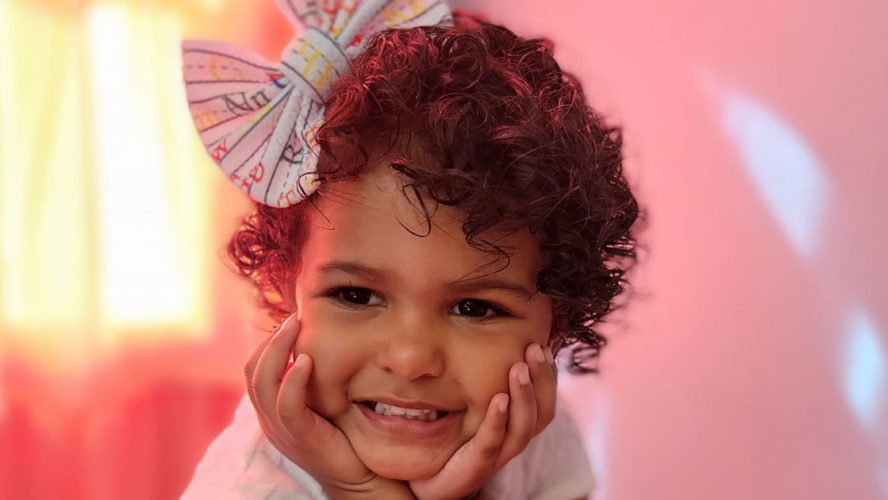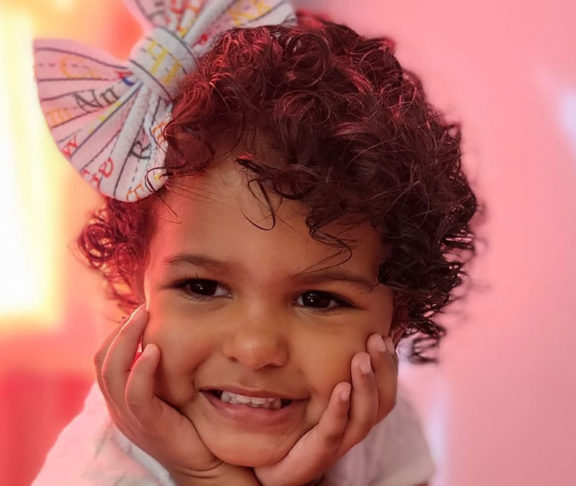Leah is turning three this year, but she’s already lived an eventful life. Diagnosed as a baby with acute lymphoblastic leukemia (ALL) — a cancer where the bone marrow makes too many white blood cells — she’s now in her second round of treatment and awaits a bone marrow cell transplant.
Everything was going well for Leah until she was seven months old. Her mother, Tanya who is a registered nurse, took her to the doctor because the infant had lost her appetite. Her mother and doctor thought Leah was teething but within three days she was back at the doctor’s office. This time, she wasn’t eating or drinking anything, not even water.
Labs at the hospital showed she had ALL. The diagnosis came as a shock.
“My child’s life was slipping through my fingers,” says Tanya. “I had no idea. I would have never thought cancer. Never.”
Resilience
Doctors started Leah on chemotherapy but she relapsed five days before finishing her treatment. Now she is receiving immunotherapy treatment and being prepped for a bone marrow transplant.
Despite her diagnosis, Leah is a happy toddler. She is fluent in Spanish and English and enjoys reading books. She’s learning sign language too. So far, she knows how to sign over 100 words.
“She manages everything so well and of course children are resilient, but I love that over all these years of treatment ever since she was seven months old, she has not stopped smiling,” says Tanya.
Finding a match
Looking for a donor match has been challenging for Leah, who has Puerto Rican and Dominican heritage.
“Because of her ethnicity, we cannot find a perfect match — a compatible donor, which means a 10 out of 10,” says Tanya. “Because in this worldwide registry, there are barely Hispanic populations registered.”
A patient’s ethnic background is a significant determinant in their likelihood of finding a donor match. That’s because human leukocyte antigen (HLA) markers used in matching are inherited and some ethnic groups have more complex HLA than others.
According to Be The Match® — a nonprofit organization that matches patients with donors for a life-saving marrow or umbilical cord blood transplant — only 48% of Hispanics find a match on the registry, compared to 79% of whites, 47% of Asians or Pacific Islanders and 29% of Black or African Americans. We need to increase the diversity of the Be The Match Registry to increase the odds for patients.
“It was very devastating to know that there was no one on that list with over 10 million people on it,” says Tanya. “It’s harsh.”
While a 10 out of 10 match is ideal for transplant, if Leah does not find her match, she might be getting a 5 out of 10 match, known as a haplo match. Her mother will be that haplo donor if the ideal match donor is not found soon.
A chance
Tanya will do whatever it takes to help her daughter survive and thrive: “I want to keep my child,” she says. “I want to see my child grow.”
Leah’s family has been encouraging would-be donors, especially Hispanics, to sign up for the registry. All it takes is swabbing your cheek and sending the sample back to Be The Match.
“Every registered person is hope. It’s a chance,” says Tanya, who’s hosted sign up drives in Puerto Rico and Kentucky.
“If it’s not for Leah, it’s for somebody else,” she says. “There are lot of children and adults who are needing this life saving transplant. I am trying to do what’s in my hands to raise awareness for everyone, not just my child.”
To register with Be The Match, go to https://my.bethematch.org/planetleah.



